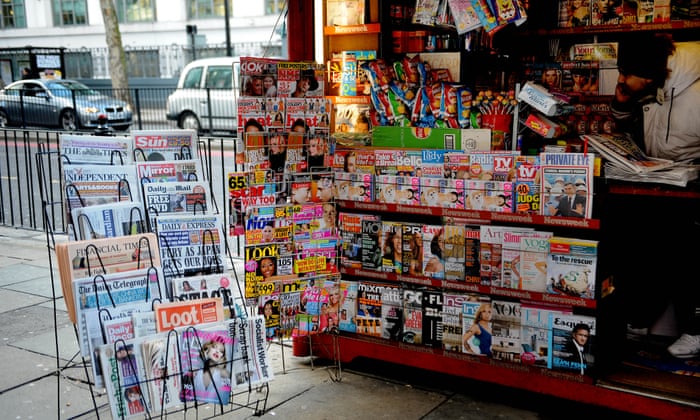https://www.theguardian.com/media/greenslade/2016/sep/23/publishers-and-journalists-must-work-together-to-save-journalism
The digital revolution has caused newspapers to go out of business in the UK, USA, Canada, and Australia and other European countries. However it isn't negative fore everyone as Journalists and publishes want very different things. On the whole publishes want profit an journalists are criticizing them for cutbacks particularly in the way they are done. Commercial effects of technology have caused losses throughout all print media so the cutbacks are indeed necessary what isn't necessary is the fact the ordinary people are losing their jobs while the people in charge are continuing to receive excessive rewards. However both parties are still having to ensure their products remain alive within the industry and the changing times in most cases rather than making a profit people are having to look at keeping their losses to a minimum, this is the point it has reached. Reporters are the ones hit the hardest as you spend more money on them that hey bring back, they often spend months on one story but the commercial downfall, due to the movement online, means that even though they can bring in a story that could help the reputation of the newspaper and can become something incredibly important for the audience. They lose money.
o In 2009 105 Newspapers closed (many were beginning to be replaced by websites.
o Overall Ad Sales for print fell by 30% in 2009.
o FREE daily newspapers accounted for 7% of newspaper circulation
I think that publishers and journalists have separated and has sped the effect of the digital revolution, on both sides their have been failings to adapt and cater for the changes. Many failed to or created websites to late, the rise in AD revenue on line corresponded with the fall of AD revenue for print. Transferring to an online platform wouldn't have remade all losses but would have helped greatly particularly in terms of building and appealing to a larger audience. Between the two sides there is immense censorship on what is shown and there are too many dominant ideologies that are only shown, the rise of news channels on sites such as YouTube, not only showed people news stories in their entirety as they could be dedicated to a video of any desired length, but also had fewer restrictions so certain things can be talked about and shown, regardless of powerful figures that may have been involved. However recently Google has changed their YouTube monetization which has resulted in a lot of controversy and criticism of control especially with the rule against news channels. The censorship against a predominantly educational aspect of the internet mirrors the actions of people who owned newspapers and raises the question as to whether institutions in power are trying to remain in power by reducing the freedom of online creators and whether they only want certain ideologies to be shown on their sites? However it wouldn't be easy to have complete control as trends change all the time, people are always creating a new site/app, so if one becomes to censored and the audience feels that they are not able to speak freely. They can easily find somewhere else to share their unchanged and uncensored views.
The digital revolution has caused newspapers to go out of business in the UK, USA, Canada, and Australia and other European countries. However it isn't negative fore everyone as Journalists and publishes want very different things. On the whole publishes want profit an journalists are criticizing them for cutbacks particularly in the way they are done. Commercial effects of technology have caused losses throughout all print media so the cutbacks are indeed necessary what isn't necessary is the fact the ordinary people are losing their jobs while the people in charge are continuing to receive excessive rewards. However both parties are still having to ensure their products remain alive within the industry and the changing times in most cases rather than making a profit people are having to look at keeping their losses to a minimum, this is the point it has reached. Reporters are the ones hit the hardest as you spend more money on them that hey bring back, they often spend months on one story but the commercial downfall, due to the movement online, means that even though they can bring in a story that could help the reputation of the newspaper and can become something incredibly important for the audience. They lose money.
o In 2009 105 Newspapers closed (many were beginning to be replaced by websites.
o Overall Ad Sales for print fell by 30% in 2009.
o FREE daily newspapers accounted for 7% of newspaper circulation
I think that publishers and journalists have separated and has sped the effect of the digital revolution, on both sides their have been failings to adapt and cater for the changes. Many failed to or created websites to late, the rise in AD revenue on line corresponded with the fall of AD revenue for print. Transferring to an online platform wouldn't have remade all losses but would have helped greatly particularly in terms of building and appealing to a larger audience. Between the two sides there is immense censorship on what is shown and there are too many dominant ideologies that are only shown, the rise of news channels on sites such as YouTube, not only showed people news stories in their entirety as they could be dedicated to a video of any desired length, but also had fewer restrictions so certain things can be talked about and shown, regardless of powerful figures that may have been involved. However recently Google has changed their YouTube monetization which has resulted in a lot of controversy and criticism of control especially with the rule against news channels. The censorship against a predominantly educational aspect of the internet mirrors the actions of people who owned newspapers and raises the question as to whether institutions in power are trying to remain in power by reducing the freedom of online creators and whether they only want certain ideologies to be shown on their sites? However it wouldn't be easy to have complete control as trends change all the time, people are always creating a new site/app, so if one becomes to censored and the audience feels that they are not able to speak freely. They can easily find somewhere else to share their unchanged and uncensored views.







